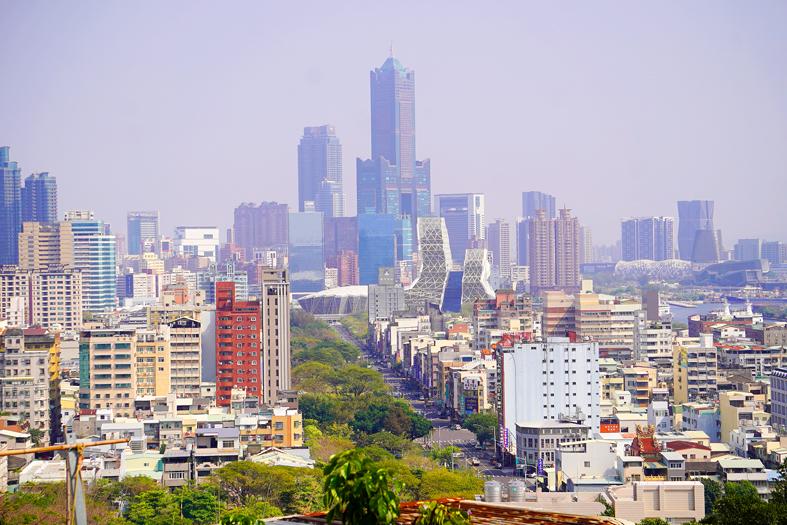Combined property tax revenue in the first quarter of the year soared nearly twofold annually to a new high of NT$7.29 billion (US$249.78 million), more than the sum of the previous five years, due to steep hikes in housing prices and active transactions, Sinyi Realty Inc (信義房屋) said.
The sharp gain in property tax revenue — also known as integrated house and land sales tax — mocked a spate of unfavorable policy measures introduced by the government to induce a soft landing for housing prices, the nation’s sole listed broker said in a news release on Thursday.
Taichung’s property tax revenue increased 62 percent year-on-year to NT$1.55 billion, making the special municipality the largest contributor of property taxes in the country, Sinyi research manager Tseng Ching-der (曾敬德) said.

Photo: CNA
New Taipei City ranked second with NT$1.02 billion in property tax revenue, more than doubling the NT$480 million it recorded a year earlier, Sinyi said, citing government data.
If unfavorable measures worked, property transactions and property tax revenue would have declined, Tseng said, adding that when property gains outpace tax burden increases, people make transactions.
Kaohsiung placed third, contributing NT$9.4 billion in property tax revenue, a 99 percent increase from a year earlier, Sinyi said.
Property tax revenue in Taipei rose 87 percent to NT$840 million, jumped 182 percent in Taoyuan to NT$810 million, while Tainan generated NT$640 million of property tax revenue, an 89 percent increase from a year earlier.
Property tax revenue spiked 480 percent to NT$370 million in Hsinchu County and increased 145 percent to NT$250 million in Hsinchu City.
The extension of property taxes to presale contract transfers also helped drive up overall property taxes, Tseng said.

UNCERTAINTY: Innolux activated a stringent supply chain management mechanism, as it did during the COVID-19 pandemic, to ensure optimal inventory levels for customers Flat-panel display makers AUO Corp (友達) and Innolux Corp (群創) yesterday said that about 12 to 20 percent of their display business is at risk of potential US tariffs and that they would relocate production or shipment destinations to mitigate the levies’ effects. US tariffs would have a direct impact of US$200 million on AUO’s revenue, company chairman Paul Peng (彭雙浪) told reporters on the sidelines of the Touch Taiwan trade show in Taipei yesterday. That would make up about 12 percent of the company’s overall revenue. To cope with the tariff uncertainty, AUO plans to allocate its production to manufacturing facilities in

Taiwan will prioritize the development of silicon photonics by taking advantage of its strength in the semiconductor industry to build another shield to protect the local economy, National Development Council (NDC) Minister Paul Liu (劉鏡清) said yesterday. Speaking at a meeting of the legislature’s Economics Committee, Liu said Taiwan already has the artificial intelligence (AI) industry as a shield, after the semiconductor industry, to safeguard the country, and is looking at new unique fields to build more economic shields. While Taiwan will further strengthen its existing shields, over the longer term, the country is determined to focus on such potential segments as

TAKING STOCK: A Taiwanese cookware firm in Vietnam urged customers to assess inventory or place orders early so shipments can reach the US while tariffs are paused Taiwanese businesses in Vietnam are exploring alternatives after the White House imposed a 46 percent import duty on Vietnamese goods, following US President Donald Trump’s announcement of “reciprocal” tariffs on the US’ trading partners. Lo Shih-liang (羅世良), chairman of Brico Industry Co (裕茂工業), a Taiwanese company that manufactures cast iron cookware and stove components in Vietnam, said that more than 40 percent of his business was tied to the US market, describing the constant US policy shifts as an emotional roller coaster. “I work during the day and stay up all night watching the news. I’ve been following US news until 3am

COLLABORATION: Given Taiwan’s key position in global supply chains, the US firm is discussing strategies with local partners and clients to deal with global uncertainties Advanced Micro Devices Inc (AMD) yesterday said it is meeting with local ecosystem partners, including Taiwan Semiconductor Manufacturing Co (TSMC, 台積電), to discuss strategies, including long-term manufacturing, to navigate uncertainties such as US tariffs, as Taiwan occupies an important position in global supply chains. AMD chief executive officer Lisa Su (蘇姿丰) told reporters that Taiwan is an important part of the chip designer’s ecosystem and she is discussing with partners and customers in Taiwan to forge strong collaborations on different areas during this critical period. AMD has just become the first artificial-intelligence (AI) server chip customer of TSMC to utilize its advanced